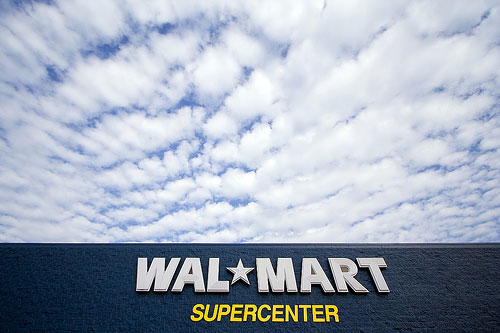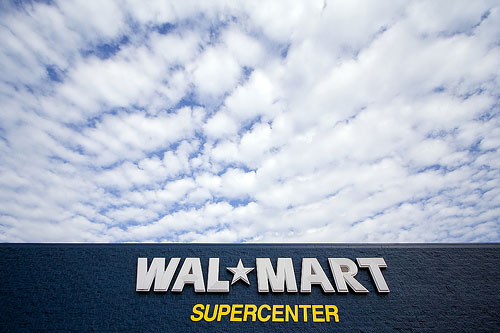 Photo: Code PoetWalmart looms over the U.S. food landscape like … well, like a vast block-like structure plunked down amid low-slung suburban sprawl. It opened its first “superstore” featuring groceries in 1988. Today, Walmart operates 2,750 superstores nationwide — and owns a commanding 25 percent share of the U.S. grocery market, more than that of its three largest competitors combined. Think about that: Of every dollar Americans spend on groceries, a quarter goes to Walmart.
Photo: Code PoetWalmart looms over the U.S. food landscape like … well, like a vast block-like structure plunked down amid low-slung suburban sprawl. It opened its first “superstore” featuring groceries in 1988. Today, Walmart operates 2,750 superstores nationwide — and owns a commanding 25 percent share of the U.S. grocery market, more than that of its three largest competitors combined. Think about that: Of every dollar Americans spend on groceries, a quarter goes to Walmart.
To date, its dominance hasn’t had a benign effect on the food system. As it gobbled market share through its “everyday low prices” policy,” Walmart forced its food suppliers (think huge companies like Smithfield, Tyson, Sara Lee, Kraft) to scale up and slash costs. As the food industry scrambled to toe Walmart’s line, pressure to deliver the goods at a price the Giant of Bentonville would accept meant pressure to cut wages and cut corners on things like worker safety and environmental protection. (For an excellent account of Walmart’s effect on the food industry, see Barry C. Lynn’s classic 2006 Harper’s piece.)
Public health, too, has suffered from the ubiquity of Walmart’s superstores and their bounty of cheap, processed goods. In a recent study, University of North Carolina researcher Charles Courtemanche found that presence of Walmart supercenters tracks with significant gains in obesity rates. His conclusion: “These results imply that the proliferation of Walmart Supercenters explains 11 percent of the rise in obesity since the late 1980s.” He adds, though, that Walmart shoppers may have gotten a good deal, in a very narrow economic sense: “The resulting increase in medical expenditures offsets only a small portion of consumers’ savings from shopping at Supercenters.” (One wonders how that bargain will hold up as the retail chain’s less healthy shoppers age and their diet-related maladies compound.)
Through most of its history as a grocery retailer, Walmart’s fresh-produce section has been an afterthought — a necessary formality for a business model geared to moving convenience food. A top Walmart exec acknowledged as much in a 2009 Bloomberg article on the chain’s attempt to spruce up the produce aisle to keep customers from going to the competition for veggies. “You’re in our store anyway buying Cheerios, Oreos, and milk,” the executive told Bloomberg. “We want to keep you from making another trip.”
Well, in a splashy article on the front page of the New York Times business page, Walmart has vowed to become the food system’s benign superpower. In short, the company announced it would use grocery sales not only as a way to maximize shareholder profit, but also to promote the consumption of healthier food.
Evidently, where Walmart once used its market muscle to squeeze its suppliers on price, it will now employ it to force them to cut excess salt, sweetener, and heart-destroying trans fats from processed food. Those aforementioned Cheerios and Oreos may never be the same.
As for fresh produce, the retail giant vows to continue the effort to boost quality, while at the same time cutting prices to encourage more fruit and vegetable consumption. And — this is the part that almost caused me to spit out my coffee — it says it won’t pass the burden of lower retail prices onto farmers. The Times reports:
By lowering prices on fresh fruits and vegetables, Wal-Mart says it will cut into its own profits but hopes to make up for it in sales volume. “This is not about asking the farmers to accept less for their crops,” [a Walmart executive] said.
All of this is fine and well. U.S. public health has suffered dramatically from the explosion in added sweeteners and trans fats over the past 20 years. If Walmart can force the withdrawal of some portion of that, more power to it. Walmart has graphically demonstrated the damaging aspects of severe market consolidation in the food industry. If it can now demonstrate a benevolent side to market domination, then I salute it.
But market power is a fickle thing. It answers to the demands of shareholders, not to the needs of communities. Walmart execs have convinced their shareholders that benevolence — or at least its appearance — will be profitable. But that could change. In the end, a robust, ecologically sound food system, one that nourishes the public and builds wealth in communities, won’t magically appear at the behest of some suits in Bentonville, Ark.
The hundreds of thousands of people working to build such food systems in communities nationwide shouldn’t sneer at Walmart’s announcement. Indeed, it’s likely that their work forced the company to make these concessions. But nor should it cause them to slow down, even for a second.


